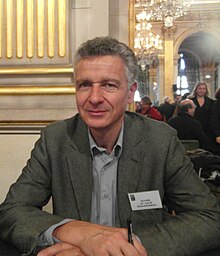|
Olivier Le Cour Grandmaison
Olivier Le Cour Grandmaison (born 19 September 1960), is a French political scientist and author whose work chiefly centres on colonialism. He is best known for his book Coloniser, Exterminer - Sur la guerre et l'Etat colonial. Le Cour Grandmaison is a professor of political science at the Évry-Val d'Essonne University and a teacher at the Collège International de Philosophie.[citation needed] He is the president of the 17 October 1961 Association Against Oblivion, which advocates official recognition for the crimes committed by France during the 1961 Paris massacre.[not verified in body] Coloniser, ExterminerIn his book Coloniser, Exterminer (2005), Le Cour Grandmaison states that techniques and concepts used during the period of late 19th-century New Imperialism were later used during the Holocaust. He points to both Tocqueville and Michelet who spoke of "extermination" during the colonization of the Western United States and the removal of Native American tribes.[1] He quotes Tocqueville's 1841 comment on French conquest of Algeria:
"Whatever the case, continued Tocqueville, we may say in a general manner that all political freedoms must be suspended in Algeria."[3] According to LeCour Grandmaison, "De Tocqueville thought the conquest of Algeria was important for two reasons: first, his understanding of the international situation and France’s position in the world, and, second, changes in French society."[4] Tocqueville, who despised the July Monarchy (1830–1848), believed that war and colonization would "restore national pride, threatened, he believed, by "the gradual softening of social mores" in the middle classes. Their taste for "material pleasures" was spreading to the whole of society, giving it "an example of weakness and egotism". Applauding the methods of Thomas Robert Bugeaud, Tocqueville went as far as saying that "war in Africa" had become a "science":
LeCour Grandmaison states that techniques employed by the French army during the 1954-62 Algerian War were rooted in history. He believes the history of warfare should be not limited to the technical progress of weapons, but should encompass the "judicial, administrative and conceptual arsenal" which accompanies it: "We can only understand the extreme the violence of the 1848 civil war - which much of the time qualifies as "bloody repression" - if we place them in a longer genealogy, by the way exterior, and brought back to what was experimented before,[clarification needed] most notably during the Algerian war [the 1830 invasion of Algeria]"[5] In the same interview,[which?] LeCour Grandmaison, distinguishes between the criticisms of colonial abuse and those of the principle of colonization itself, basing his arguments on Zola, Victor Hugo, Lamartine, Darwin, André Gide, Albert Londres, Jules Verne, Maupassant, Foucault, Barthes and Joseph Conrad. He states how Marx, Engels and their contemporaries were not immune to 19th-century racial ideology, as they too considered colonization as inevitable and justified, and non-European people as "primitives" and "barbarians". It wasn't until the Third International that the socialist movement opposed colonialism and supported national liberation movements.[6] State racismFollowing the views of Michel Foucault, LeCour Grandmaison spoke of a "state racism" under the French Third Republic, notable by the example of the 1881 Indigenous Code applied in Algeria. Replying to the question "Isn't it excessive to talk about a state racism under the Third Republic?", he replied:
23 February 2005 lawOlivier LeCour Grandmaison was one of a number of historians who criticized the 23 February 2005 law, instituted by the Union for a Popular Movement (UMP), which required that teachers promote "positive values" of French presence abroad, "in particular in North Africa". The law was not only accused of interfering with the autonomy of Universities within the state, but also of being an obvious case of historical revisionism.[7] The legislation was repealed by president Jacques Chirac in 2006 following criticisms in France from historians and the left-wing, and from abroad, including Algerian president Abdelaziz Bouteflika and Négritude writer Aimé Césaire. BibliographyMajor works
Articles
See also
References
|
||||||||
